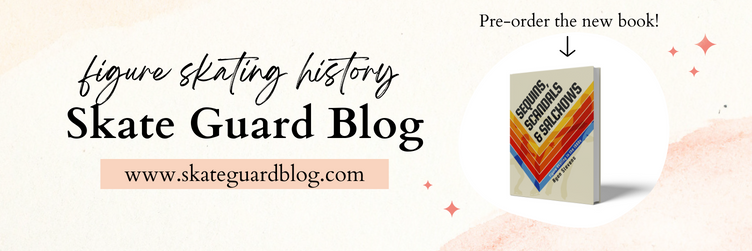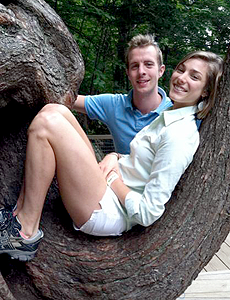Interview With Carter Jones And Richard Sharpe
Finishing just off the podium at the 2012/2013 British Figure Skating Championships as senior ice dancers mere months after teaming up, Carter Jones of Virginia Beach, Virginia and Richard Sharpe of Chelmsford (Essex), England are a dance team that is definitely ready to shake things up this season. With good edges, musicality and a great rapport on the ice, they have already had international experience at events like the Junior Grand Prix event in Sheffield, England and the 2012 U.S. International Classic. In this interview, I learned more about how this team has progressed so quickly, what programs they have created for the upcoming 2013/2014 season and their opinions on the ice dance discipline as a whole.
Q: Having just teamed up in May of 2012, within 3 months you had already qualified for the British National Championships? How were you able to achieve that level of skating and a connection in such a short period of time?
A from Richard: In the first 9 weeks of our partnership, we spent a minimum of 4 hours a day, 5 days a week on the ice and an hour off-ice to make sure our programs were choreographed and ready for the Lake Placid event in late July. Naturally we got know each other very quickly and very well. We both shared the same ambition in skating so working together to reach the same goal supported a strong relationship between us.
Q: You are currently ranked 4th in Great Britain as senior ice dancers. What aspects of your skating are you specifically focusing on more to make the podium next season?
A from Richard: As last year it was all a bit of a rush, we have taken the time this year to focus on our basic skating skills both separately and together. We have been working on increasing the level of intricacy and difficultly of our elements and choreography to really highlight our strengths and capabilities for the coming season.
Q: Have you selected your programs for next season, and if so, what will you be skating to?
A from Richard: Yes, we have selected both short dance music and free dance. Our short dance this year is a medley of an English singer, Robbie Williams. We will be starting with his version of "Let's Face the Music and Dance" (quickstep) followed by a very fitting foxtrot for our partnership called "Have You Met Miss Jones." For our free dance we have chosen to travel to the other end of the music spectrum. We are combining an orchestral version of "Roxanne" by Maga Zoltan, mixed with a slow piece by Escala, "Finding Beauty".
Q: What is one piece of music you'd love to see skated to or to skate to yourself that no one has ever skated to previously?
A from Richard: The piece of music that we both have had a strong passion for is in fact Roxanne. We were concerned with the popularity and over-use of the original song, but when we found this version, it allowed us to use the music but enabled us to tell our own story to it.
Q: Great Britain is a country that has produced some of the biggest names in skating history - Jayne Torvill, Christopher Dean, Robin Cousins, John Curry... who are your favourite British skaters and what other ice dance teams do you look up to?
A from Richard: We both have always been admirers of the great team that was Jane Torvill and Christopher Dean. Their ingenuity and creativity on the ice completely revolutionized the sport of ice dance. From the moment they stepped on to the ice at competition they captivated the eyes of the audience, and we strive to do the same. Of course it is always a great pleasure to watch the top teams in the world. It is inspiring to see the power and strength that Meryl Davis and Charlie White bring along with the quality and effortless finesse that Tessa Virtue and Scott Moir portray.
Q: I actually have a strong British connection myself. My father, uncle and grandparents are all from there and I grew up eating amazing British food, constantly laughing at my grandmother's amazing sense of humor and watching shows like Are You Being Served?, Keeping Up Appearances, Absolutely Fabulous, French And Saunders and The Vicar Of Dibley. What makes British culture so different than North American culture?
A from Carter: It has been fun to experience some of the British culture skating with Richard this past year and traveling overseas to compete. One of my favorite qualities of Richard is his sense of humor, which took some adjusting at first but I’m now able to keep up with his jokes and appreciate British comedy. I’ve enjoyed trying new foods that Richard has introduced to me and been able to incorporate a couple of British phrases and terms into my vocabulary.
A from Richard: It pleases to see some of the old English comedies popping up there. I'm a big fan of “Only Fools and Horses” and “The Two Ronnie's” myself. The cultures are very different even though we speak the same language. People over here take great interest in hearing me speak and asking me questions about where I'm from because it's not common, whereas with all the countries in Europe being so close to each other it is common for us to hear different accents and languages in England.
Q: What is the most challenging part about ice dancing?
A from Richard: It's finding within yourself the drive and determination everyday to get out of bed, go to the rink, put on your skates, and skate, skate, skate. If you mess something up, do it again. If you fall, do it again. If you do it correctly... Do it again. Remembering to make sure whatever happens, you do it because you love it! Not because it has become a routine for you.
A from Carter: I think that one of the most difficult things within the sport is the mental ability to keep everything in perspective. When you do the same thing everyday it is easy to put too much focus on minor details and lose sight of the big picture. The mental strength this sport requires is greater than any physical test I have experienced. Luckily with ice dancing, you are never alone. I am grateful I have Richard to help me through the struggles and share the accomplishments with.
Q: Has the elimination of the compulsory dance(s) helped or hurt the sport?
A from Carter: Initially, I was not a fan of eliminating the compulsory dances. Now however, I think the incorporation of the compulsory dance within the original dance has created a very interesting and challenging event for the short dance. In my opinion, it better allows each individual team to highlight their strengths in different ways throughout the program while still maintaining the structure of the compulsory dance.
A from Richard: Combining the original dance and the compulsory dance has made more aspects of the discipline interesting. Seeing how people interpret the compulsory and the different spins you can put on the dance creates much more exciting than having 24 teams at a competition using the same 4 tracks.
Q: What direction do you see ice dance going in the future?
A from Carter: The difficulty of ice dancing has increased exponentially since my first time watching it in the Winter Olympics in 2006. Training at the level we currently do, it’s hard to imagine how it could become even more challenging. Ice dancing has taken on a new level of acrobatics within the lifts, and stressed importance of precision and elegance in respect to footwork and choreography. I’m sure with the rise of new competitors on the scene, ice dance will naturally continue to grow as it has in the past. For me, it’s hard to pick a specific goal to achieve. I’ve always been one to do something because I love it and till I’m pleased. If that means competing at Worlds and the Olympics, then that’s great. If it means making the podium at Nationals, that’s great too. As long as I know I’m putting 100% into my training on a daily basis and leaving everything I have out on the ice in that four minute program, I know I’ll be proud of myself and achieve my goal.
A from Richard: At the moment ice dance is in a very good place. It's modern, exciting and it has changed so much over the last decade it is hardly recognizable as the same event. It has taken on much more of a sport role than an art. My goal has been since I was a kid, to get to the Olympics. Since pairing up with Carter, her family has helped with me moving to America, creating a life for myself out in the States and has given me a family away from home. For that I want her to succeed more than anything. So when she's satisfied with how far we get, I'll be satisfied.
Q: What is the best advice would you give other skaters on stepping up their game and improving their skating skills?
A from Carter: The best advice I could offer for young and rising skaters would be to simply remember that you do this sport because you love it. Remember who you are, don’t sweat the small stuff, and make the best of the experience along the way. Oh, and try not to tick off your partner.
A from Richard: the best advice I could ever give to a young lad doing the sport is to simply keep at it if you love doing it. Through my fourteen years of education, I was severely bullied for doing things that I loved. Ice skating wasn't the only thing I took part in as a youngster. I also did a variety of different dance disciplines including tap and ballet. It made me want to quit, but I wanted to show every boy that ever wants to do ice skating or dance or anything that may be considered "girly" that it most certainly isn't and that it will be worth it in the end.
Skate Guard is a blog dedicated to preserving the rich, colourful and fascinating history of figure skating. Over ten years, the blog has featured over a thousand free articles covering all aspects of the sport's history, as well as four compelling in-depth features. To read the latest articles, follow the blog on Facebook, Twitter, Pinterest and YouTube. If you enjoy Skate Guard, please show your support for this archive by ordering a copy of the figure skating reference books "The Almanac of Canadian Figure Skating", "Technical Merit: A History of Figure Skating Jumps" and "A Bibliography of Figure Skating": https://skateguard1.blogspot.com/p/buy-book.html.

